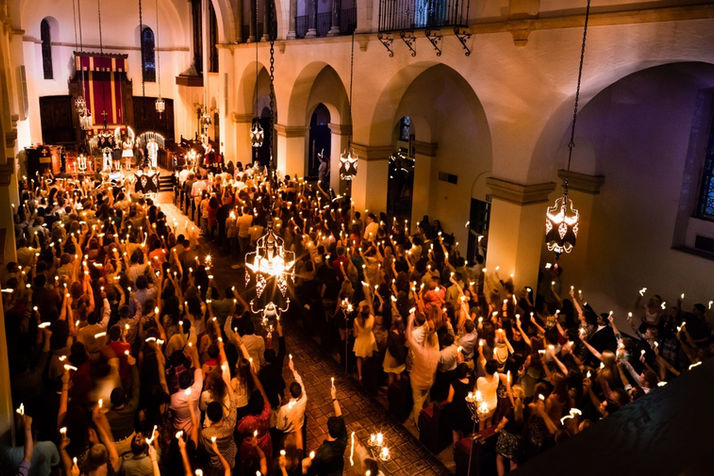Rollins College

Building Name: Rollins College
Address: 1000 Holt Avenue, Winter Park, FL 32789
Link to location on Google Maps: Rollins College - Google Maps
Year Built: Founded 1885, Campus plan 1927
Architect of Record: Richard Kiehnel – Campus Plan
Design Architect (if different): Varies by Building
General Contractor: Various
Noteworthy Architectural Features: Loggias and covered walkways link buildings set on quadrangles and small courtyards to capture breezes. The campus is aligned on axis with Interlachen Avenue, terminating on Mills Library (now Rollins Hall). Students walk this axis down Mills Lawn out the gate from the campus down Interlachen Avenue to the Congregational Church to complete their graduation exercises in the “Real” world.
How to Visit: The campus is open to the public. Their website focuses on student visitors interested in learning more about the curriculum, the web link is: In-Person Campus Tours of Rollins College. Visitor parking may be difficult to find, there are a few multi-story garages.
Architectural Style: Neo-Renaissance and Mediterranean Revival
Website:
Related Links:
https://scholarship.rollins.edu/archv_books/7/
Description:
Rollins College is Florida’s oldest Post Secondary Institution, and has been independent, nonsectarian, and coeducational from conception. The Florida Congregationalist Association began discussions for a college in Florida 1883. Expectations were high as the Congregationalists had also established such prestigious institutions as Harvard, Yale, Dartmouth and Oberlin. A generous gift of $50,000 by Allonzo Rollins, a New England native who wintered in central Florida, secured Winter Park as the location and the college named for his generosity. Founded in 1885, classes were held in the Congregational Church and on the second floor of White’s Hall at 152 South Park Avenue near the train station until facilities were completed on the campus property.
New England Congregationalists founded Rollins on 10 acres of land at the southern end of the planned Winter Park downtown along the shore of Lake Virginia. A gift from Francis Knowles financed the construction of the three first buildings. Knowles Hall housed classrooms, administration, library and chapel. Pinehurst and Lakeside Cottages provided dormitories for women and men respectively, they were opened in 1886. The early wood framed buildings have not survived.
Hamilton Holt assumed the role of President of the college in 1925. As the editor of The Independent, before coming to Rollins, he was familiar with the currently popular Frederick Law Olmstead and John Nolen, influencing an American Renaissance to create a more human urban fabric. John Nolen’s new town of Venice Florida had a symmetrical layout with a sophisticated park system placing recreation and leisure as a priority. Holt desired a campus based on these philosophies.
His search for an architect led him to Richard Kiehnel, who had just completed the Rolyat Hotel in St. Petersburg Florida. The talented architect’s inspiration for the hotel was a medieval Spanish monastery. A series of buildings arranged around a central plaza anchored by an imposing tower, based on Seville’s Torre Del Oro, the hotel’s charm was exactly what Holt had envisioned for his institution. The firm Kiehnel and Elliot of Pittsburgh Pennsylvania, established in 1906, was retained to develop a campus plan.
For Rollins College, Kiehnel developed a plan in 1927 grouping 29 structures around a central lawn to form a neo-Renaissance academic village, terminating the lawn’s axis at a library tower 29 stories tall. The library as planned was never built, but in 1949 Mills Library was built in that location, designed by James Gamble Rogers II. After construction of a larger Mills Library the building is now known as Rollins Hall.
The campus showpiece, Knowles Chapel was designed by Ralph Adams Cram and completed in 1932. Reflecting 17th century Spanish architecture, the campanile is modeled after the Toledo Cathedral, and is prominent over the low scale campus. The nave is spanned by a timber rafter vault supported by a series of plaster arches down each side, with wrought iron galleries in the upper arcade openings. Six plaster buttresses capped with coquina stone finials support each side of the nave volume along the exterior. The Rollins College motto “Fiat Lux”, which means “Let there be Light”, is inscribed on the chapel entrance. A carved stone tympanum above this entrance depicts the Spanish conquistadors planting the first cross on American soil.
Adjacent, is the Annie Russell Theater designed by the author of the campus plan Richard Kiehnel.
Internationally renowned British actress Annie Russell retired from the New York stage to Winter Park in 1918. She became involved in the Rollins theater department. Her wealthy friend and admirer Mary Curtis Bok Zimbalist donated $100,000 for the building with the provision that Russell would serve as the director, as long as she was able. The theater Is designed in the Romanesque Revival Style, with an ornamented stage ‘fly tower’ also with arcaded windows, tiled roof and cresting.
The chapel and theater are connected by a plaster arcade with vaulted timber framing and clay tile roof, enclosing a serene courtyard with plantings and fountain, typical of Kiehnel’s plan for the campus architecture.






